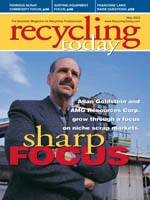Economic forecasts—even recycling-specific ones—from the past several months have almost universally been issued with the caveat that predicted prices and consumption patterns are subject to change completely depending on the military situation in Iraq.
While Iraq was neither a major generator or consumer of recyclable materials, the thinking was that capital spending that will spur the North American and Western European economies depends on investors and executives whose minds are at ease that a war will not disrupt their plans.
The military conflict in Iraq appears to have reached a conclusion, one that theoretically should ease the fears of board members, small business owners and individuals who may have been holding off on spending due to fears of a long war that would not go well for the U.S.-led coalition.
Unfortunately, just as this potential barrier to economic revival has lifted, a new one has arisen in its place—and it’s one that could have a much more direct effect on recycling markets.
The emergence of SARS (sudden acute respiratory syndrome) in East Asia and North America has perhaps initially attracted more media attention than its numbers merit. Several skeptics are now stepping forward to say that over-reaction to the disease is causing more harm than good.
But the appearance of a disease that is both new and that has a fearful mortality rate has gained the attention of immunologists and other medical specialists, followed by a flurry of media reports.
As of mid-April, the potential of a wider SARS epidemic had most certainly created a pandemic of fear and caution in East Asia and in North American cities where it had claimed victims. Surgical masks have become standard apparel in some larger Asian cities, as a mid-April photo of a Hong Kong wedding party (bride included) wearing the masks seems to indicate.
Travel to and from (as well as within) East Asia has dried up, and the number of government-imposed quarantines is being surpassed by self-imposed quarantines. Understandably, until people feel assured that SARS is better understood, is treatable and is not a threat on public sidewalks, busses and trains, they will be likely to stay close to home as much as possible.
The longer this situation lasts, economists are already pointing out, the greater the chance that the economic engine currently driving the basic materials markets will retreat from its steady growth.
Even though Chinese planners will continue to build bridges, roads and industrial plants to drive the basic materials markets, if a fair percentage of China’s 1.3 billion people stay home rather than earn and spend disposable income, this will ultimately affect that nation’s economy.
The world is watching with the hope that SARS will be contained and eventually found to be treatable. A self-imposed quarantine may cause an economic hiccup, but the suffering is minor compared to the alternative of a wider epidemic.
Get curated news on YOUR industry.
Enter your email to receive our newsletters.
Explore the May 2003 Issue
Check out more from this issue and find your next story to read.
Latest from Recycling Today
- ReMA opposes European efforts seeking export restrictions for recyclables
- Fresh Perspective: Raj Bagaria
- Saica announces plans for second US site
- Update: Novelis produces first aluminum coil made fully from recycled end-of-life automotive scrap
- Aimplas doubles online course offerings
- Radius to be acquired by Toyota subsidiary
- Algoma EAF to start in April
- Erema sees strong demand for high-volume PET systems






